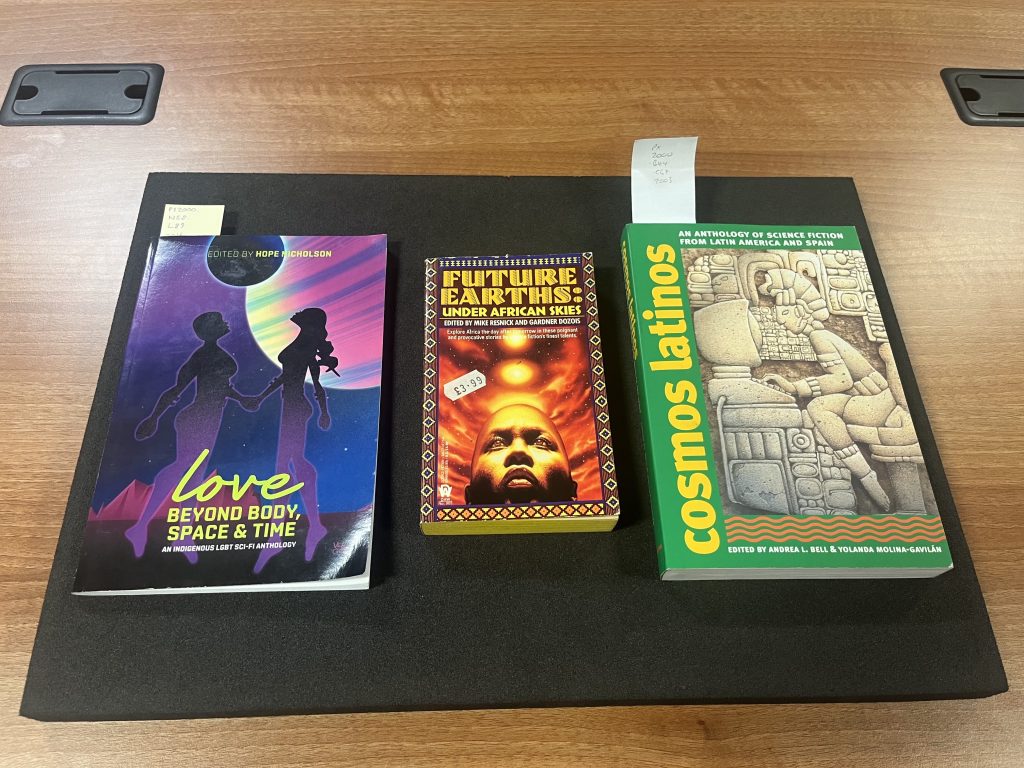To celebrate Black History Month 2024, we’ve put together a review of some of the activities undertaken in Special Collections and Archives over the last year that relate to Black History. From recent acquisitions of books originally belonging to a Liverpool family who profited from the transatlantic slave trade to a digital project aiming to help students and researchers decolonise the genre of science fiction, these activities run from a recognition of violence against Black people in the past whose effects are felt today through to imaginings of flourishing Black societies of the future.
The Waterhouse Cotton Ledger Conservation
In June 2024 the Waterhouse Cotton Ledger was returned having undergone extensive conservation undertaken by Sharon Oldale and funded primarily by the National Manuscripts Conservation Trust. The Ledger is one of the few sources for the pre-1815 Liverpool cotton trade and so an important historical resource for the study of the relation of Liverpool to the transatlantic slave trade. The Ledger is an account book of the firm of Nicholas Waterhouse and Co, Liverpool cotton brokers and contains entries dated from 1799 to 1802 over 500 folios organised on a client-by-client basis. Clients include Richard Arkwright Jr, and Liverpool slave traders including the Earles, Tarletons, and Hindes. The cotton that Waterhouse imported primarily originated in Demerara and was cultivated by enslaved labour.
As a result of its historical importance, the Ledger has been viewed by researchers on numerous occasions. By 2022 the Ledger was in a poor condition and could not be accessed without damaging it further. In recognition of the object’s importance and with a view to allowing future access, the Ledger was sent away for conservation. The conservation work now complete, the Ledger is available for consultation for scholars working on the relationship between Black History and the Liverpool region.
Black History Exhibits at the Harold Cohen
Special Collections and Archives has continued to support the series of exhibits hosted in a display case in the Harold Cohen Library on aspects of Black History in relation to science by providing materials for display. The exhibits are curated by Dr Carl Larsen and members of the DeCol-SoLS-Advocates, a student and staff group in the School of Life Sciences who aim to develop an anticolonial curriculum and encourage a more inclusive environment for marginalised students.
Recent exhibits have interrogated the influence of John Edmonstone, a Black taxidermist, on the thought of Charles Darwin; the contributions to science of Dr Charles Henry Turner, a Zoologist and Comparative Psychologist whose work was overlooked because he was Black; and the legacy of Henrietta Lacks, an African-American woman whose cancer cells were taken without consent and developed into an immortal cell line which is still used in research today.
Yates Family Library Acquisitions
This year the University of Liverpool acquired 17 books from the library of the Reverend Samuel Ashton Thompson Yates (1843-1903). Thompson Yates was a member of a prominent Liverpool family whose wealth was in large part due to profits generated from the transatlantic slave trade. Samuel’s grandfather, Joseph Brooks Yates, had numerous holdings in plantations in Jamaica and received compensation after the enactment of the Slavery Abolition Act of 1833. This wealth allowed the Yates family to accumulate a large collection of books and manuscripts.
One of the books in the collection recently acquired by Special Collections and Archives speaks most directly to this legacy. Free Blacks and Slaves: Would Immediate Abolition be a Blessing? (1853) by Samuel’s brother-in-law, Henry Arthur Bright (1830-1928) argues against the immediate abolition of slavery in America. Bright instead argues for a colonisation scheme, in which emancipated African-Americans would be relocated to the Colony of Liberia in Africa. Bright was a well-known Liverpool figure, more famous for his books on gardening. However, the book is a testament to the resistance of Liverpool society that had profited from slavery to the emancipation of enslaved Black people.
Decolonising Science Fiction Libguide
From September 2023 to April 2024 Student Partner Neil Drew-Lopez created a resource for students and researchers interested in the project of decolonising science fiction. The genre of science fiction first emerged out of colonial adventure narratives in the nineteenth century and has historically been produced in the main by white men from the Anglosphere. However, many authors of colour such as Samuel R. Delany, Octavia E. Butler, and Nalo Hopkinson have seen in science fiction a way of making a space for themselves. In particular, movements such as Afrofuturism and Africanfuturism have sought to wrest the genre away from white and Western dominated futures towards imagining futures in which Black people not only exist but flourish.
The Libguide gives an overview of what it would mean to decolonise science fiction before going on to list items within the Science Fiction Collections that could be used to further this end. The project of decolonising science fiction not only interrogates the colonial roots and structure of the genre but also seeks to amplify or celebrate those authors who are critical of or move beyond its white and Western centred bias. Sections in the Libguide cover resources that critique the colonial influence of science fiction and those that explore future imaginaries of colonised cultures. Each resource has a link to our catalogue so that researchers can consult them in our Reading Room.
Taken together, the activities explore many facets of Black History. The Waterhouse Cotton Ledger and Free-Blacks and Slaves are a testament to the deep ties between the city of Liverpool and the enslavement of Black people in the Americas. The materials supplied to the Harold Cohen exhibits curated by DeCol-SoLS-Advocates celebrate the vital contribution of Black figures to scientific discovery. The Decolonising Science Fiction Libguide, though recognising the legacy of colonialism in science fiction, gives a more hopeful history of Black resistance within a literary genre which has historically excluded them. From painful past to hopeful futures, the projects reflect the rich history of Black people that can now be consulted at the Special Collections and Archives.




